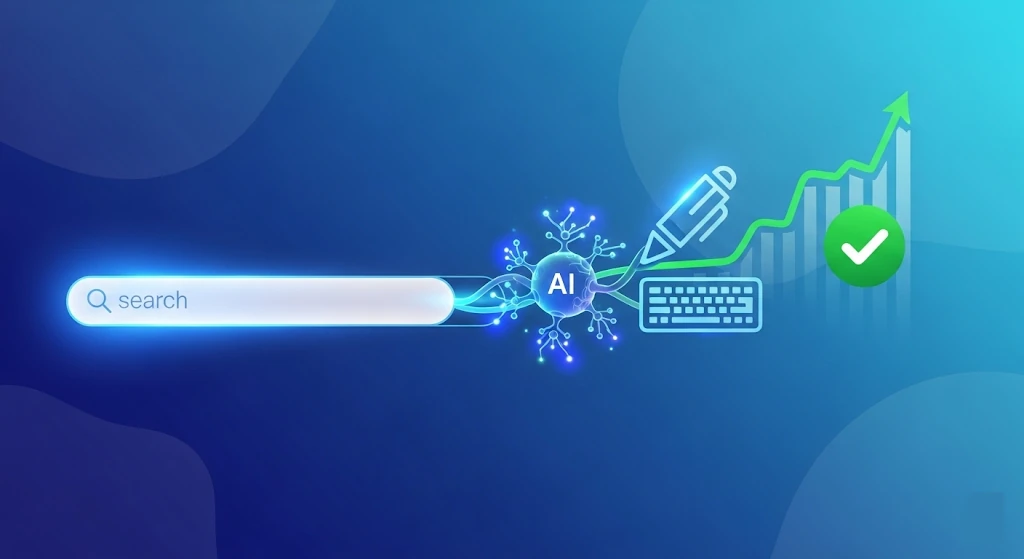
SEO has always been about being one step ahead in how people search. Yet, we all know that keyword hunting, optimizing content, and technical glitches are like a full-time job. And here is the win: AI tools are transforming the game. In this guide, “SEO + AI Tools: How to Use ChatGPT and Other AI to Optimize Content”, we will take a look at how these tools can be used to help you write more effective content, refine your strategy, and save yourself time. The goal? To demonstrate how AI can assist you in your digital marketing strategy without depriving it of the human element, making it feel trustworthy and relatable.
The Changing Terrain of SEO and AI
The prime age of SEO is something you might have heard about if you’ve spent some time in the digital field. Back then, it was all about stuffing keywords into blog posts and chasing backlinks wherever possible.
But today? That approach would sink your site faster than you can say “penalty.”
Modern SEO is centered on user intent. Google’s AI-powered algorithms, “especially updates like RankBrain and BERT,” don’t just match keywords anymore. They try to understand what the searcher is actually looking for.
This is where AI tools step in. Platforms like ChatGPT, Jasper, and SurferSEO can help marketers:
- Identify intent-driven keywords
- Organize content so it’s easier to consume
- Spot potential technical fixes for better optimization
And here’s the great news: AI isn’t here to replace you. It makes you more effective. Consider it your co-pilot, taking the grunt work, the data-intensive work off your hands so you can concentrate on strategy, creativity and bring your unique expertise.
How to Use ChatGPT and Other AI for Content Optimization

Here’s where things get exciting. ChatGPT, along with other AI tools, isn’t just a brainstorming buddy! It can actually help you fine-tune content so it performs better in search. Think of it as having a fast, smart assistant that can review your draft in seconds and point out ways to make it stronger.
Here’s how you can put ChatGPT to work for optimization:
Sharpen your structure: Copy your text and query, “What can I do to make better H2s and H3s to make this article more SEO-friendly?” In a moment, you’ll have a clear outline which you can adapt to your style.
Spot what’s missing: Ever hit publish only to realize you forgot an important FAQ? ChatGPT can scan your draft and highlight potential content gaps readers might expect.
Polish titles and meta descriptions: Instead of staring at a blank screen, let AI pitch 10 clickable options. Then, you pick the one that matches your tone.
Keep it readable: In case your sentences are too long, AI will suggest an easier version of them, but you will still sound like yourself.
The idea is not to copy-paste blindly. Use AI suggestions as a base then add your expertise, anecdotes and insights. It’s the balance that transforms a generic draft into content that is alive, believable, and is optimized to both humans and search engines.
How to Use Other AI for Your SEO Strategy
Let’s break down five practical ways AI can enhance your SEO efforts. Each section comes with examples and tips on how to make sure you’re still meeting Google’s E-E-A-T principles: “Expertise, Experience, Authoritativeness, and Trustworthiness.”
1. Supercharge Your Keyword Strategy
So, let’s start with the backbone of SEO – keywords. But finding the right ones is harder than ever. Gone are the days of ranking for single generic terms. Now, it’s about discovering long-tail phrases and clusters that relate to what people are asking.
How AI helps:
Using ChatGPT or other similar tools, you can have a list of keyword clusters generated in seconds. An example is when you own a small company where you sell wooden spoons that are handmade. You may no longer simply aim at wooden spoons but rather inquiry about an AI tool:
“What long-tail keywords are related to handmade wooden kitchen utensils?”
The tool might suggest:
- “How to care for wooden spoons”
- “Best wood for kitchen tools”
- “Unique handmade gifts for chefs”
That’s a goldmine of content ideas – without hours of manual brainstorming.
E-E-A-T Tip:
Once you have AI’s suggestions, apply your human experience. When customers have inquired about how to avoid cracking spoons, make a blog post out of it. That personal touch is the thing that AI cannot replicate, and it is what gives your content authority.
2. Use AI Tools for On-Page Content Optimization
Ranking is more than just keywords and it is also about how your contents are organized. These are headings, readability and flow; all of this is important to the search engines as well as readers.
How AI helps:
AI tools are able to create a blog outline, propose subheadings, or even point out gaps in your draft. Using the previous example, you could be writing about “The Advantages of Minimalism.” An AI tool will be able to draft a recommended outline with such sections as Health Benefits, Financial Benefits, and How to Start Living Minimally.
But here’s where humans step in: add your stories. Maybe you downsized your closet last year and discovered you only wore 20% of your clothes anyway. That’s the kind of personal touch AI simply can’t replicate.
E-E-A-T Tip:
Use AI for efficiency, but layer in your own expertise and real-world experiences. This combo creates content that’s both comprehensive and authentic – exactly what Google wants.
3. Improve Your Website’s Technical SEO
Let’s be honest – technical SEO isn’t the fun part. Fixing broken links, speeding up load times, and checking metadata doesn’t exactly spark creativity. But it’s absolutely essential if you want your site to perform well.
How AI Helps:
Let’s say you export your site data from Google Search Console. Instead of scanning thousands of rows yourself, feed it into an AI tool. It can flag which pages have seen the biggest traffic drops and even suggest possible fixes.
Another time-saver? Auto-generating alt text for hundreds of images at once. Instead of writing “Image123.jpg,” AI can generate “Hand-carved wooden spoon with smooth finish.” This improves accessibility and SEO.
E-E-A-T Tip:
A smooth, error-free site shows Google and your visitors that you care about quality and trustworthiness. Think of technical SEO fixes as the invisible trust signals behind your content.
4. AI Tools to Build Backlinks and Boost Authority
Backlinks are still one of the strongest signals of authority, but finding good opportunities often eats up time.
How AI Helps:
Rather than searching the web yourself, simply ask an AI: “What are some relevant podcasts or blogs in the sustainable living niche that allow guest posts?” In a few seconds, you will get a list of curated contacts to begin outreach.
It is also possible to compose outreach emails with AI, yet do not send a blanket pitch. Customize it with references to their work or with your special expertise
E-E-A-T Tip:
Backlinks are all about building authority. Getting mentioned on reputable, relevant sites tells Google your content deserves trust. AI just makes the hunt easier.
5. Fine-Tune Local SEO
If you run a local business, showing up in “near me” searches is make-or-break.
How AI Helps:
Tools like Semrush’s AI description generator can create polished Google Business Profile descriptions. It is also possible to study customer reviews with the help of AI and get recommendations on how to respond.
As an example, when a person leaves a review: “I enjoyed the quick service, but I would like to see more vegetarian food,” the AI can produce a professional and polite response in a couple of seconds.
E-E-A-T Tip:
Regular and careful interaction establishes credibility with clients and demonstrates to Google that your company is vigilant and trustworthy.
Explore more on Local SEO to maximize your local presence and reach.
Top AI-Powered SEO Tools
There are a lot of platforms, and it can be daunting. The following are some of the best AI-powered tools to look at:
- For Keyword Research: Ahrefs, Semrush, SurferSEO
- For Content Creation: ChatGPT, Jasper, Frase
- For Technical SEO: Screaming Frog, Google Search Console
- For Local SEO: Moz Local, BrightLocal
Pro tip: Don’t rely on just one. Each tool has its own strengths and mixing them gives you a fuller picture of your SEO Benefits.
Conclusion: The Future of SEO is Human + AI
It’s not a new fad anymore; it’s part of how search engines work and how content gets found. And fact is – AI cannot substitute human creativity, experience and trust in the audience.
The smartest approach? See AI as your wingman. Engage it in the heavy lifting, e.g., data analysis, keyword clustering, and technical fixes, and you get to concentrate on strategy, storytelling, and authenticity.
With the right blend of SEO and AI Tools and how to Use ChatGPT and Other AI for Content Optimization, you can:
- Build smarter keyword strategies
- Publish content that actually connects with readers
- Keep your site technically sharp
- Earn authoritative backlinks
- Dominate local search results
Ultimately, it is AI that enables you to work smarter, not harder. And when you pair it with the expertise of your human, the result is content that cuts through, builds credibility and ranks where it matters.
Frequently Asked Questions
1. Does AI content damage SEO rankings?
Not at all. Google pays attention to the quality and usefulness of content–not whether it was authored using AI. The trick here is to put in your own knowledge and make it useful to the reader.
2. Can I use ChatGPT to do keyword research?
Yes, but just make sure to double-check AI suggestions against tools like Ahrefs or Semrush to confirm the data.
3. What is the biggest error people make with AI in SEO?
Over-reliance. Without human editing, publishing AI content results in generic, surface-level posts. Optimize AI efficiency with your own knowledge to achieve the best results.


